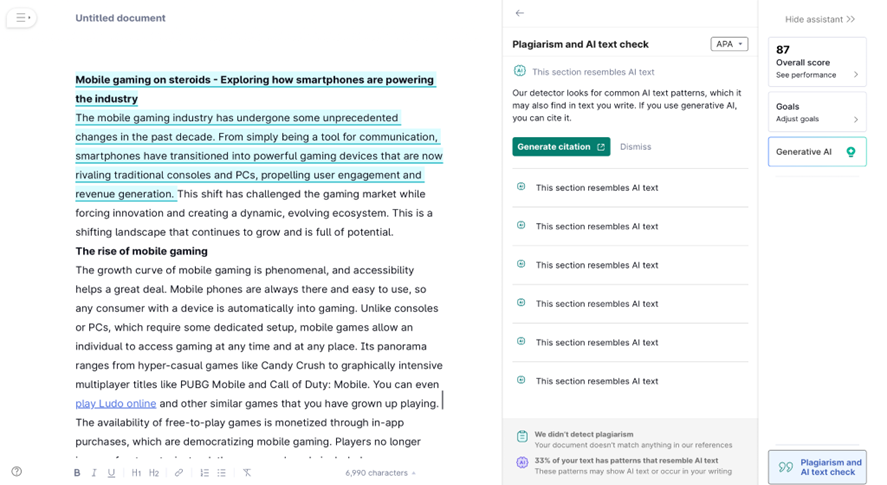The mobile gaming industry has undergone some unprecedented changes in the past decade. From simply being a tool for communication, smartphones have transitioned into powerful gaming devices that are now rivaling traditional consoles and PCs, propelling user engagement and revenue generation. This shift has challenged the gaming market while forcing innovation and creating a dynamic, evolving ecosystem. This is a shifting landscape that continues to grow and is full of potential.
The rise of mobile gaming
The growth curve of mobile gaming is phenomenal, and accessibility helps a great deal. Mobile phones are always there and easy to use, so any consumer with a device is automatically into gaming. Unlike consoles or PCs, which require some dedicated setup, mobile games allow an individual to access gaming at any time and at any place. Its panorama ranges from hyper-casual games like Candy Crush to graphically intensive multiplayer titles like PUBG Mobile and Call of Duty: Mobile. You can even play Ludo online and other similar games that you have grown up playing.
The availability of free-to-play games is monetized through in-app purchases, which are democratizing mobile gaming. Players no longer incur upfront costs; instead, they are now largely included.
Consequently, the mobile gaming market has been considered the most lucrative segment of the global gaming market because it overshadows and even surpasses consoles and PC gaming in terms of revenue.
Technological innovations driving mobile gaming
The advancement of smartphones is the core concept behind mobile gaming. Hardware and software advances over the years have revolutionized what is possible for mobile games to provide. Here’s a brief look:
- Processing power and graphics
Increased power processors, including Apple’s A series and Qualcomm’s Snapdragon, allow smartphones to process graphically demanding games. GPUs, such as Adreno and Mali, bring console-quality graphics to handheld devices, making it possible to truly immerse in gameplay.
- Display technology
High-refresh-rate displays (90Hz and 120Hz) have enhanced gaming experiences by offering smoother visuals and better responsiveness. AMOLED screens with HDR support add to the visual appeal, making gaming more vibrant and engaging.
- Cloud gaming and 5G
Removing hardware limitations, cloud gaming services like NVIDIA GeForce NOW and Xbox Cloud Gaming are transforming mobile gaming. Since 5G networks offer ultra-fast and low-latency connectivity, people can actually stream high graphics games directly on their smartphones.
- Longer battery life
Longer battery life, in combination with fast charging technology, ensures uninterrupted gaming sessions. Power-efficient chipsets are also provided to further optimize battery usage during prolonged games.
Mobile gaming impacting software development
The popularity of mobile gaming has pushed smartphone manufacturers to customize their devices according to the needs of the users. Indeed, firms such as ASUS (ROG Phone series), Xiaomi (Black Shark series), and Lenovo (Legion Phone) have released gaming-centric smartphones with the implementation of complex cooling systems, high touch sampling rates, and specialized gaming modes.
Mainstream smartphone brands, such as Samsung, Apple, and OnePlus, have also increased their gaming capabilities. For example, they focus on performance optimization, extra features in gaming software, and compatibility with controllers and VR headsets.
Mobile gaming and the global economy
The economic influence of mobile gaming is huge. Industry reports suggest that mobile games produce over half of the entire income in the gaming industry. This financial success is not only game developers’ gains but also extends to accessory manufacturers, cloud service providers, and esports organizers. Here’s a deeper look into understanding how mobile gaming is influencing the global economy:
- Esports and competitive gaming
Mobile gaming has, in large part, contributed to the growth of esports. Tournaments for Garena Free Fire and Clash Royale gather millions of viewers and boast large prize pools. This legitimized the mobile gaming genre as an esports category and today, this category is growing to include various types of games and gamers.
- Job creation and development
The video game industry has also created millions of jobs, from game development and marketing to the creation of content and streaming. One of the most remarkable developments has been that of indie developers because mobile platforms allow millions of players to be reached in a relatively cost-effective manner.
The changing demographics in gaming
Mobile gaming now broadens the demographic profile of gamers. The mobile gaming market appeals to a diverse population. Unlike traditional gaming platforms, which mainly target young males, mobile gaming appeals to a wide audience. Women, aging adults, and casual players make up the largest portion of the mobile gaming market. This has made mobile gaming one social phenomenon that transcends generations and cultural barriers.
What are the challenges and future potential?
Despite its success, mobile gaming faces challenges, including market saturation, competition, and the need for innovation to retain user interest. Additionally, issues like data security and the prevalence of microtransactions have drawn criticism.
However, the future of mobile gaming remains bright, with several exciting trends on the horizon:
- Augmented Reality (AR) gaming
Games such as Pokémon GO have already demonstrated the potential of AR, and this technology is expected to develop further into even more immersive experiences.
- Integration with AI
Games run by AI and the development of smarter algorithms will enhance gameplay and create adaptive gaming environments that are customized to the individual player.
- Cross-platform play
Collaboration among mobile, console, and PC gaming platforms is intensifying, breaking borders between devices and ensuring a seamless experience for players.
Concluding thoughts
Smartphones have completely revolutionized the gaming industry and pushed it into uncharted territories. From technological advancements to economic contributions, mobile games epitomize how innovation alone can revolutionize an entire sector. With advancements in smartphones, better use of their abilities will unlock mobile gaming’s next levels, and such games will indeed lead the charge in the gaming revolution. A casual player or even a competitive gamer, it’s clear that mobile gaming is here to stay and is only getting better.
Have you experienced the madness of mobile gaming yet? If you are a beginner, you can start by playing simple games that you know, like Ludo, Sudoku, Snakes & Ladders, among others. Once you have the hang of them, you can participate in tournaments or even level up to engage in esports competitions.








